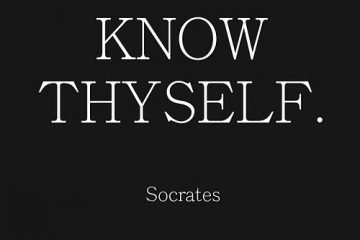
Click below to listen to this article:
Self-concept
The notion of the self-concept is a central topic in psychology, as it refers to how we perceive ourselves and our relation to the world. The self-concept can be defined as the individual’s belief about himself or herself, including the person’s attributes and who and what the self is. It has three main components: self-image, self-esteem, and ideal self. Self-image is how we see ourselves at the present moment, based on our physical characteristics, personality traits, and social roles. self-esteem is how much we value and accept ourselves, and it can affect our motivation, attitude, and behaviour. The ideal self is the person we aspire to be, and it reflects our dreams, goals, and hopes. The self-concept is not static, but rather dynamic and malleable. It can change over time and across different situations, depending on our experiences, feedback, and self-knowledge. The self-concept is also influenced by various factors, such as our interaction with significant others, our culture, our media exposure, and our comparison with others. Understanding the self-concept is important because it can help us explain and predict our behaviour, emotions, and well-being. It can also help us improve our self-awareness, self-regulation, and self-development. In this article, we will explore the notion of the self-concept in more detail, and examine how it is used in different fields of psychology.
What is the self-concept?
The self-concept is a complex and multifaceted construct that refers to how individuals perceive and evaluate themselves. It encompasses various aspects of one’s identity, such as personality traits, abilities, values, goals, roles, and social relationships. The self-concept is not a static or fixed entity, but rather a dynamic and evolving one that changes over time and across situations. The self-concept is influenced by both internal and external factors, such as self-awareness, self-esteem, self-regulation, feedback, social comparison, and cultural norms. The self-concept has important implications for one’s psychological well-being, motivation, behaviour, and interpersonal interactions. Understanding the nature and development of the self-concept can help individuals enhance their self-knowledge, self-acceptance, and self-improvement.
Self-image
Self-image is one of the aspects of self-concept, which is the overall perception that a person has of themselves. It refers to how a person sees themselves in terms of their physical appearance, personality traits, and social roles. Self-concept, on the other hand, encompasses not only self-image, but also self-esteem, which is the evaluation that a person makes of their own worth, and ideal self, which is the representation of what a person wishes to be or achieve.
The meaning of self-image can be explored by examining how it is formed and influenced by various factors, such as early childhood experiences, social interactions, life events, media exposure, and feedback from others. Self-image can also affect a person’s behaviour, motivation, and emotions. For example, a person with a positive self-image may feel confident and optimistic, while a person with a negative self-image may feel insecure and pessimistic.
Self-image can be changed or improved by engaging in activities that enhance one’s skills, abilities, and appearance, such as learning new things, exercising, grooming, and dressing well. Self-image can also be improved by seeking positive feedback from others, such as friends, family, mentors, or therapists. Additionally, self-image can be improved by challenging negative thoughts and beliefs about oneself and replacing them with more realistic and positive ones.
self-esteem
self-esteem is a term that refers to how a person evaluates their own worth and abilities. Self-concept is a broader term that encompasses the cognitive and affective aspects of one’s identity, such as beliefs, values, emotions, and goals. self-esteem is often considered as a component or dimension of self-concept, but it is not synonymous with it.
One way to understand the relationship between self-esteem and self-concept is to use the analogy of a house. Self-concept is like the structure and design of the house, while self-esteem is like the paint and decoration. Self-concept provides the foundation and shape of one’s identity, while self-esteem adds colour and style. Both are important for creating a comfortable and attractive living space, but they are not the same thing.
Another way to explore the meaning of self-esteem as related to self-concept is to examine how they influence each other. Research has shown that self-esteem can affect self-concept by enhancing or diminishing certain aspects of one’s identity. For example, a person with high self-esteem may emphasize their positive traits and achievements, while a person with low self-esteem may focus on their flaws and failures. Conversely, self-concept can affect self-esteem by providing feedback and validation for one’s worth and abilities. For example, a person with a positive and coherent self-concept may feel more confident and satisfied with themselves, while a person with a negative and fragmented self-concept may feel more insecure and unhappy.
In summary, self-esteem and self-concept are related but distinct concepts that describe different aspects of one’s identity. self-esteem is an evaluative judgment of one’s worth and abilities, while self-concept is a cognitive and affective representation of one’s identity. self-esteem and self-concept can influence each other in various ways, depending on their level and quality. Understanding the meaning and relationship between these two concepts can help one improve their psychological well-being and personal growth.
Ideal self
The ideal self is a concept that refers to the person one aspires to be, based on one’s values, goals, and beliefs. The ideal self is an important component of the self-concept, which is the mental representation of one’s identity, attributes, and roles. The self-concept influences how one perceives oneself and the world, how one relates to others, and how one behaves in different situations.
The ideal self can serve as a source of motivation and inspiration, as well as a guide for decision-making and action. However, the ideal self can also create challenges and conflicts, especially when there is a discrepancy between the ideal self and the actual self, which is the realistic appraisal of one’s current state. This discrepancy can lead to dissatisfaction, frustration, anxiety, or low self-esteem.
Therefore, it is important to explore the meaning of the ideal self and how it relates to the self-concept. By doing so, one can gain a better understanding of oneself and one’s potential, as well as identify areas of growth and improvement. Moreover, one can learn to balance the ideal self and the actual self, and to accept oneself as a whole person with strengths and weaknesses. This can foster a positive and healthy self-concept that supports one’s well-being and happiness.
Rogers’ theory of personality and behaviour
The self-concept is used in Rogers’ theory of personality and behaviour, which is a humanistic approach that emphasizes the uniqueness and potential of each individual. Rogers believed that people have a natural tendency to grow and achieve their goals, which he called Self-actualization. However, this process can be hindered by the conditions of worth that society imposes on them, such as expectations, judgments, and criticisms. These conditions of worth can create a gap between the person’s true self (who they really are) and their ideal self (who they think they should be). This gap leads to incongruence, which is a state of psychological distress and dissatisfaction.
Rogers proposed that for a person to achieve congruence and Self-actualization, they need a supportive environment that provides them with three core conditions: genuineness (being honest and authentic), acceptance (being valued and respected without conditions), and empathy (being understood and cared for). These core conditions can be offered by a therapist in person-centred therapy, which is a non-directive approach that allows the client to explore their own feelings and experiences at their own pace. The therapist does not give advice or interpret the client’s behaviour, but rather reflects what the client says and feels. The therapist’s role is to facilitate the client’s self-discovery and self-acceptance.
Rogers’ theory of personality and behaviour has been influential in the field of psychology and beyond. It has inspired many other humanistic theories and approaches, such as Maslow‘s hierarchy of needs, existential therapy, positive psychology, and motivational interviewing. It has also been applied to various domains, such as education, health care, social work, and organizational development. Rogers‘ theory of personality and behaviour is based on the premise that people are inherently good and creative, and that they can overcome their difficulties and fulfil their potential if they are given the right conditions.
Core-self and self-concept
According to Carl Rogers, one of the founders of humanistic psychology, personality and behaviour are influenced by the way a person perceives themselves and their environment. This perception is called the phenomenal field. Within the phenomenal field, there are two important aspects of the self: the core-self and the self-concept.
The core-self is the innate and authentic part of a person which is present from birth. It is the source of a person’s potential, creativity, and Self-actualization. The core-self is also influenced by the organismic valuing process, which is an innate tendency to seek experiences that enhance one’s growth and avoid those that hinder it.
The self-concept is the learned and acquired part of a person that is shaped by their interactions with others and their environment. It consists of the beliefs, attitudes, and values that a person holds about themselves. The self-concept can be divided into two components: the self-image and the ideal-self.
The self-image is how a person sees themselves in relation to others and their environment. It includes aspects such as physical appearance, abilities, roles, and social status. The ideal-self is how a person would like to be or what they aspire to become. It reflects a person’s hopes, goals, and desires.
The relationship between the core-self and the self-concept is crucial for a person’s psychological well-being. Rogers proposed that when the core-self and the self-concept are consistent or congruent, a person experiences harmony, satisfaction, and positive regard for themselves and others. However, when the core-self and the self-concept are inconsistent or incongruent, a person experiences conflict, anxiety, and negative regard for themselves and others.
One of the main sources of incongruence is the condition of worth, which is when a person receives positive regard from others only if they meet certain expectations or standards. This leads a person to deny or distort their true feelings and needs to gain approval or avoid rejection. As a result, the self-concept becomes more distant from the core-self and the organismic valuing process.
Rogers believed that to reduce incongruence and enhance congruence, a person needs an environment that provides them with three essential conditions: genuineness, acceptance, and empathy. These conditions allow a person to express their true feelings and needs without fear of judgment or criticism. They also help a person to become more aware of their core-self and their organismic valuing process. Through this process of self-discovery and self-acceptance, a person can achieve their full potential and become a fully functioning person.
Applications of the self-concept
The self-concept can be divided into different aspects, such as self-image, self-esteem, and ideal self. Here are some examples of how the self-concept is used in modern psychology:
- Self-image is the view one has of oneself, which may or may not reflect reality. For example, a person with anorexia may have a distorted self-image of being fat, even though they are thin. Self-image can be affected by various factors, such as parental influences, friends, media, etc. Psychologists may use techniques such as the Twenty Statements Test to assess one’s self-image.
- self-esteem is the value one places on oneself, or how much one likes, accepts, and respects oneself. For example, a person with high self-esteem may feel confident and worthy, while a person with low self-esteem may feel insecure and inferior. self-esteem can be influenced by one’s comparison with others, feedback from others, and one’s role in society. Psychologists may use scales such as the Rosenberg self-esteem Scale to measure one’s self-esteem.
- The ideal self is the person one wishes to be or thinks they should be. For example, a person may aspire to be more successful, attractive, or intelligent than they currently are. Ideal self can be influenced by one’s goals, values, and expectations. Psychologists may use techniques such as the Q-Sort Method to identify the discrepancy between one’s ideal self and actual self.
According to humanistic psychologist Carl Rogers, a healthy self-concept is achieved when one’s self-image and ideal self are congruent or aligned. This means that one’s perception of oneself matches one’s aspirations for oneself. However, when there is incongruence or mismatch between one’s self-image and ideal self, one may experience psychological distress or dissatisfaction. Rogers proposed that providing unconditional positive regard (acceptance and support without judgment) can help people achieve congruence and develop their potential.
Further reading
If you are interested in learning more about the self-concept, here are some weblinks that you can check out for further reading:
Self-Concept in Psychology: Definition, Development, Theories
This article provides a comprehensive overview of what self-concept is, how it develops, how it can be changed, and what theories have been proposed to explain it. It also includes some frequently asked questions and answers about self-concept.
Self-Concept in Psychology: Definition, Development, Examples
This article explains the different aspects of self-concept, such as self-image, self-esteem, and ideal self. It also discusses how self-concept is influenced by various factors, such as social and humanistic psychology.
Self-concept – Wikipedia
This article gives a brief introduction to the concept of self-concept and its history. It also outlines some of the main dimensions and measures of self-concept, as well as some of the related topics and issues.




0 Comments